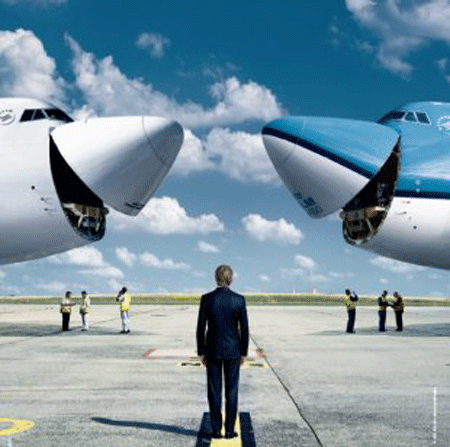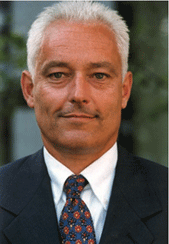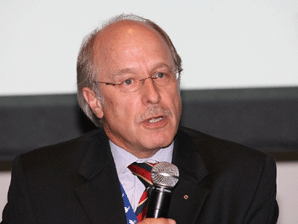KL/AF
Surcharge Reaction

E-mails keep pouring in, telephones are
constantly ringing and faxes roll out of the machine:
The airfreight industry seems to be mesmerized
by KLM Air France Cargo’s new approach on prices.
If the carrier’s announced change
of price calculation was only intended to be a PR gag they already would
have landed a very big hit.
Which it is not, of course, since the airline
insures that it is determined to take on things seriously by including
fuel surcharges partly in the freight rates starting September 1.
 “We
want to offer the industry a sustainable solution,” stated Jean-Charles
Foucault, (right) Senior VP Sales and member of the joint cargo management
committee at AF-KLM Cargo. “We
want to offer the industry a sustainable solution,” stated Jean-Charles
Foucault, (right) Senior VP Sales and member of the joint cargo management
committee at AF-KLM Cargo.
By saying this he threw a snowball down
the hill that has grown to a global avalanche.
And of course like always when someone comes
up with a new approach there are enthusiasts and critics that support
or condemn the initiative.
By far the biggest groups are the forwarding
agents that maybe not unanimously, but in general, supporting the new
price mechanism.
 “By
including certain proportions of the fuel surcharges in the air freight
rates our commissions will consequently be augmented to some extent,”
lauds Michael Claus, (left) Miami-based Managing Director Global Partner
Network of Hellmann extolling news from Paris. “By
including certain proportions of the fuel surcharges in the air freight
rates our commissions will consequently be augmented to some extent,”
lauds Michael Claus, (left) Miami-based Managing Director Global Partner
Network of Hellmann extolling news from Paris.
But he also warns the carrier:
“We will very closely watch if this
mechanism might eventually lead to hiking the prices at the end of the
day.”
“KLM Air France Cargo sent a sign
by integrating the kerosene surcharge in the rate,” applauds Ruediger
Ostrowski, helm of North Rhine-Westfalia’s (Germany) Forwarding
and Logistics Association.
Not without adding a ‘but’ to
his statement:
“To come to a final conclusion we
still wait for detailed information that we have not been given so far.”
He has touched a general problem since KL/AF
Cargo released only meager information via internet together with a new
price list that’s been sent to the customers following the Paris
press meeting.
Further, the training of their global sales
force on the new and somehow complicated mechanism only started July 1.
Therefore, it’s only now that the
sales guys can swarm out to knock at the doors of agents and shippers
to praise the new price model.
One of the first clients they might visit
is German pharmaceutical producer Roche Diagnostics.
There, Dirk Schneider, Head of International
Forwarding Management speaks of a “misleading package” the
airline is offering the market.
“Their calculation is based on the
actual weight of a shipment and not the chargeable weight for volume freight.
“Having mostly volume freight, we
end up paying a higher price,” he claims.
“If they don’t change this system
we are going to shift tonnage from Air France - KLM Cargo to other carriers,”
Schneider threatens.
Meanwhile, turbine producer MTU is more
relaxed.
“If the final price of a shipment
is not affected we don’t really care,” Odilo Muehling speaker
of the Southern German high tech producer says.
An “original and interesting initiative,”
says KL/AF Cargo’s competitor Swiss WorldCargo.
Pricing is a matter between the airline
and the customer, states Bernd Maresch, Director Marketing and Strategy
of the Swiss carrier.
“Similarly we feel that talks of commissions
and commissionability is irrelevant as the forwarder does not live on
commissions.
“Rather he negotiates rates with both
shippers and airlines and is thereby compensated by the difference of
the two prices,” the manager says.
Meanwhile, LH Cargo does not intend to modify
their price policy.
“We will stick to our system which
has become a worldwide standard,” says Head of Communications Nils
Haupt. “The new KL/AF Cargo mechanism is too complicated and not
transparent,” says Haupt as he rejects any intentions of following
suit.
Highly interesting is a hint from a leading
Middle East agent.
He claims that the French-Dutch carrier
was practically forced to introduce the new price system.
“If not, the European Commission or
the U.S. Department of Justice might have stampeded further civil action
lawsuits hitting the airline anew.
“We’ve really been screwed for
quite a while,” he says, “since the carrier did not react
in their surcharge policy to the growing gap of U.S. dollar and euro.
“Instead they kept charging an identical surcharge per kilogram
in dollars and euros, thus making nice extra profits from all customers
that had to pay their bills in euros.”
In any case this disparity of currency will
be abolished with the kick-off of AF-KLM Cargo’s new price calculation
in September.
Another take equally interesting put it
this way:
“I’ve said many times, that
the airlines should not use freight forwarders as their collection agencies
without reimbursement,” a highly placed forwarder who asked to be
unnamed said.
“The steps KL/AF are taking are in
the right direction and Cargolux seems ready to follow.
“It is about time that freight forwarders
regain their fair share of participation in total freight cost charged
by the airlines regardless of how these components are manipulated and
labeled as freight charges, fuel surcharges and security surcharges.
“This structure has got many carriers
into trouble by not applying the same charges for everyone.
“The industry understands that freight
rates may vary based on volume and frequency of the cargo but mandated
security and fuel surcharges should have been equal.
“Manipulation of those items has lead
us to where we are today, with fines and criminal indictments of carriers
and freight forwarders and ultimately claims of shippers and consignees
who were overcharged for those items.
“We want our airline partners to make
money and tell us which rates they need.
“Forwarders will have to sell those
rates to their customers.
“To be perfectly clear the forwarders
don’t set rates, the carriers do.
“Freight forwarders in fact just have
to live with carriers’ rates and pass them on as best they can.
Heiner Siegmund
|



